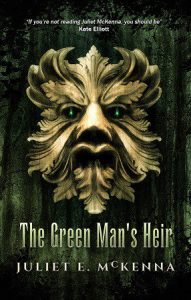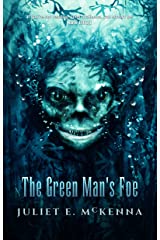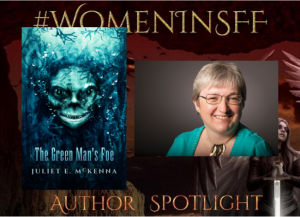Women In SFF Author Spotlight: Juliet E McKenna
Juliet E McKenna has always been fascinated by myth and history, other worlds and other peoples. Her debut epic fantasy, The Thief’s Gamble, first of The Tales of Einarinn was published in 1999, followed by The Aldabreshin Compass, The Chronicles of the Lescari Revolution, and The Hadrumal Crisis. She reviews for the web and print magazines, blogs on book trade issues, and writes diverse shorter fiction. Recent stories include contributions to the anthologies Alternate Peace, Soot and Steel, and The Scent of Tears (Tales of the Apt). The Green Man’s Heir was her first modern fantasy, published by Wizard’s Tower Press in 2018, and followed by The Green Man’s Foe in 2019. The series will continue with The Green Man’s Silence later this year.
Welcome to the Hive, Juliet E McKenna. Let’s start small: tell us about a great book you’ve read recently!
The True Queen, by Zen Cho. It’s one of those books that really shows what can be done by taking the high fantasy themes we love – the lost heir, a prophecy – and looking at them through the prism of a different mythology to the usual quasi-European, as well as using a different setting to the usual medieval-ish. In this case, Malaysian myths and monsters complicate life horribly for Regency London’s magicians as they attempt to negotiate with the Fairy Queen. It’s inventive, engaging, funny, scary, will keep you guessing and will definitely make you think.
Okay, time to escalate things: reality warps and you suddenly find yourself leading a D&D-style party through a monster-infested dungeon. What character class are you, and what’s your weapon of choice?
Cleric. I’m past my front-line fighter days so I’ll serve as back-up and tactical support with some useful magic as a bonus. I’ll take a jo staff, thanks, as I’ve been training with those in aikido classes for thirty-seven years now. If I can get some training in first, a naginata might be useful – that’s a Japanese bladed pole-arm. Either way, I prefer to keep the monsters at a distance as I put them down.
 When you’re not trawling through dungeons, how do you like to work? (In silence, with music, or serenaded by the damned souls of a thousand dead shrimps? Do you prefer to type or to hand-write? Are you an architect or a gardener? A plotter or a pantser? D’you write in your underwear, or in a deep-sea diver’s suit?)
When you’re not trawling through dungeons, how do you like to work? (In silence, with music, or serenaded by the damned souls of a thousand dead shrimps? Do you prefer to type or to hand-write? Are you an architect or a gardener? A plotter or a pantser? D’you write in your underwear, or in a deep-sea diver’s suit?)
Tell us a little bit about your writing method!
I work without music, and ideally in peace and quiet in my study surrounded by books. That said, since March I’ve been contending with the husband working from home in the spare room across the landing and having daily online meetings. I draft outlines by hand in pencil, with lots of notes, arrows and asterisks as I add new ideas. Once I have the whole story out of my head and onto paper, I work on it chapter by chapter, writing out a brief summary and adding the new tweaks that have occurred to me. That’s my guide as I start typing straight onto the computer. As the book progresses, the internal momentum will see the narrative change from the original outline and twenty-odd novels in, I’ve learned to go with the flow as that makes for a better book in the end. I work office hours 9-5, Monday to Friday and start each day reviewing what I wrote the day before. That gets me back into the groove, and line-editing as I go makes for a cleaner draft at the end. I wear comfortable clothes that are tidy enough for me to answer a ring at the door, so jeans and t-shirts with a cardigan mostly.
What (or who) are your most significant female fantasy influences? Are there any creators whom you dream of working with someday?
From my early reading, I would say Edith Nesbit, and as I grew older, Anne McCaffrey, Elizabeth Moon and Melanie Rawn. These days? Robin Hobb, Kate Elliott and most recently Lois McMaster Bujold. In terms of TV, I was recently reminded of the fantasy heroines – or rather, female heroes – girls had in the late 70s, namely Wonder Woman and The Bionic Woman. I haven’t watched either show for decades, but I am wondering if I did how much I would see that came out in my writing later.
What was the last thing you watched on TV and why did you choose to watch it? Alternatively, what games have you enjoyed recently?
We’re halfway through Season 4 of The Man in the High Castle at the moment. I’ve always found Philip K Dick’s work interesting, along with alternate history in general. A well-made show like this really resonates with the state of current politics – I do like a bit of hinterland in my viewing. I’m not a game player these days, I would prefer to spend my limited spare time reading. That said, I have told my son to keep an eye out in case Transport Tycoon turns up on Steam or a similar platform. Back in the day, when the kids were small and uninterrupted reading time was scarce, I did enjoy a good sim for relaxation. Maybe I should find the time to see what’s out there these days.
The world shifts, and you find yourself with an extra day on your hands during which you’re not allowed to write. How do you choose to spend the day?
Reading! What else?! Not just SF&F either. I read a lot of non-fiction, thrillers, crime and mystery fiction, some historicals. Anything that looks interesting really.
Can you tell us a little something about your current work(s) in progress?
I’m working on The Green Man’s Silence, going over the draft to see what editor Toby Selwyn has seen that I have missed, and where he’s flagged passages where I need to be clearer about what I mean. I also have input from a field archaeologist, and another test reader to review. Fresh eyes and expert readers always improve a book. This is the third contemporary fantasy that I’ve written drawing on the history, myths and current realities of English rural life. This time our hero Dan gets caught up in strange goings-on in the Fens, in East Anglia. The greatest danger may not be where he thinks it’s lurking.
What’s the most (and/or least) helpful piece of writing advice you’ve ever received?
The least helpful advice is to try copying something that’s been a recent great success. Every agent and editor will be seeing hundreds of imitators. A couple of the best might get picked up, but even those will have a short shelf-life. Whatever genre and themes you’re working with, you have to offer a new and different perspective.
Most helpful? Don’t get it right, get it written. No matter how ragged and ropey a draft or a day’s work might be, that can always be improved – even if that means reading it back and realising you’ve headed off down a dead end. Then you need to backtrack and find the place where you need to start again, taking a different route. However exasperating that is, it’s still progress.
Every writer encounters stumbling blocks, be it a difficult chapter, challenging subject matter or just starting a new project. How do you motivate yourself on days when you don’t want to write?
I tell myself ‘You don’t have to get it right, just get it written.’. I also clear my mind by clearing the decks of admin and other domestic chores, hopefully just for an hour or so, but sometimes I just have to write off the whole day. Then there’s always the emergency chocolate.
If you could visit any country at any point in history, where/when would you go, and why?
Classical Athens, 5th century BCE, between the Persian and Peloponnesian Wars. I studied the history and literature of the period at university, and would love to see the city in its heyday. I would be gathering up as many copies of lost plays by the era’s great dramatists as I could possibly get my hands on. The few we still have are masterpieces exploring human nature, so just imagine what we might find?
 Who are your favourite female characters in literature or pop culture? And do you have a favourite type of female character you enjoy writing?
Who are your favourite female characters in literature or pop culture? And do you have a favourite type of female character you enjoy writing?
I like to see a female hero – by which I mean a female lead character whose motivations aren’t driven by her relationships with men. If she’s in furthering the interests of husband, son, father or lover, she’s a heroine. A female hero can have any or all of these men in her life, but her motivations are her own. Unsurprisingly, these are my favourite characters to write. That said, following heroines as they realize and untangle the ties that bind them also has its fascinations for me as a writer.
Tell us about a book that’s excellent, but underappreciated or obscure.
This Is Not A Game by Walter Jon Williams. It’s the first of three near-future SF thrillers that are exciting, entertaining, and look at our relationships with technology, celebrity, politics, economics and online life without ever getting tedious or preachy. It starts with Dagmar Shaw, online game company CEO getting caught up in a real world revolution and crowdsourcing her way to safety. Then she starts thinking about what just happened…
Finally, would you be so kind as to dazzle us with an elevator pitch? Why should readers check out your work?
I write about real-life people dealing with extraordinary situations, whether that’s facing down wizards and dragons in a high-fantasy world, or meeting dryads, boggarts and worse in an English woodland just like the one you might visit.
Thank you so much for joining us today Juliet!


[…] https://fantasy-hive.co.uk/2020/07/women-in-sff-author-spotlight-juliet-e-mckenna/ […]